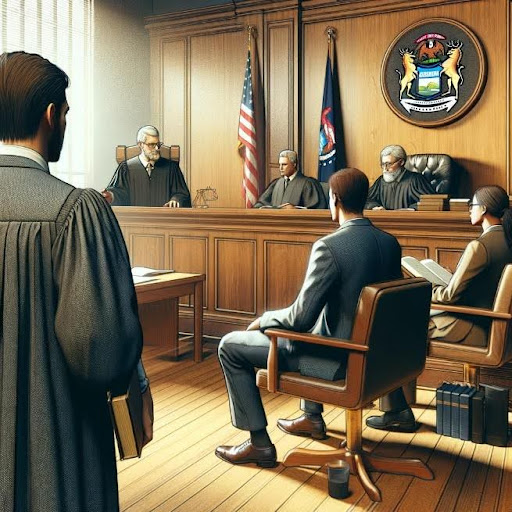






-

-
-
Maggie GeorgeRated by Super Lawyers
loading ...
In Michigan, if you are under investigation or have been arrested and charged with a crime, it is important to understand how the criminal process works. You’ll want to make sure that your rights are protected and the process is fair. Laws in Michigan address everything from initial arraignment to the final resolution of your case, whether it’s a felony, misdemeanor, or a juvenile offense. Below, George Law goes over what you need to know about the process and why you’ll want to retain a criminal defense attorney if charged.
The Arrest Process in Michigan
 An arrest is when law enforcement detains you because they believe you have committed a crime. In Michigan, this process is governed by various laws, including the Michigan Penal Code and the Michigan Court Rules. When you are arrested, officers must have either a warrant or probable cause. Probable cause means that there is a reasonable belief, based on facts, that you have committed a crime.
An arrest is when law enforcement detains you because they believe you have committed a crime. In Michigan, this process is governed by various laws, including the Michigan Penal Code and the Michigan Court Rules. When you are arrested, officers must have either a warrant or probable cause. Probable cause means that there is a reasonable belief, based on facts, that you have committed a crime.
During your arrest, officers are required to read you your Miranda rights. These rights include the right to remain silent and the right to an attorney. Remember, anything you say can be used against you in court. It’s often best to remain silent until you speak with an attorney. After your arrest, you will be taken to a police station for booking. This process includes recording your personal information, taking fingerprints, and possibly taking photographs.
In Michigan, you have the right to make a phone call following your arrest. You can use this to contact a family member, friend, or attorney. It’s important to have legal representation, so reaching out to an attorney should be a priority. After booking, you might be held in custody or released with instructions on your next court appearance. If held, you’ll be informed about the charges against you and your right to a preliminary examination within 14 days if you’re charged with a felony. This hearing is to determine if there is enough evidence to proceed with the case.
Criminal Jurisdiction
Jurisdiction refers to the authority of a court to hear and decide cases. In Michigan, criminal jurisdiction varies depending on the nature of the offense. District courts have jurisdiction over all misdemeanors (less serious crimes) and the preliminary stages of felony cases (serious crimes). Once a felony case is bound over from district court, the circuit court assumes jurisdiction. Understanding which court has jurisdiction in your case is important, as it determines where your case will be heard and what rules will apply.
Arraignment Process in Michigan
 The arraignment is an important stage in the criminal process in Michigan. This is your first court appearance after an arrest. During the arraignment, several key things happen. First, the judge formally tells you the charges against you. You’ll hear the exact legal offenses you’re accused of, as laid out in the Michigan Penal Code.
The arraignment is an important stage in the criminal process in Michigan. This is your first court appearance after an arrest. During the arraignment, several key things happen. First, the judge formally tells you the charges against you. You’ll hear the exact legal offenses you’re accused of, as laid out in the Michigan Penal Code.
You have rights in this process. You have the right to be informed of these charges in clear language. You also have the right to an attorney. If you can’t afford one, the court will appoint a public defender for you. It’s vital to have legal representation during this process, as your attorney will help you understand the charges and your options.
During the arraignment, the judge will also address the matter of bail or bond. Bail is money you pay to ensure you return for future court dates. The judge decides on bail based on factors like the seriousness of the crime, your criminal history, and your ties to the community. Michigan law outlines the guidelines judges follow in making this decision. There are different types of bonds. A personal recognizance bond means you don’t have to pay money but must promise to appear in court. A cash bond requires you to pay the full amount of the bail set. With a surety bond, you pay a bail bondsman a percentage of the bail to ensure your appearance in court.
Another key aspect of the arraignment is your plea. You can plead guilty, not guilty, or no contest to the charges. A not guilty plea means you deny the charges and the case will likely proceed to trial. Pleading guilty equates to admitting to the crime, and the judge will sentence you. With a no contest plea, you aren’t admitting any guilt but are not contesting charges. This plea is treated like a guilty plea in terms of sentencing. You’ll want to discuss your plea options with your attorney. They can advise you on the best course of action based on the specifics of your case.
Probable Cause Conference and Preliminary Examination in Michigan
Under Michigan law, you have the right to a probable cause conference within 14 days of your arraignment, and a preliminary examination no more than 7 days after the probable cause conference.
Essentially, the prosecutor must show enough evidence to convince a judge that there’s probable cause to believe that a crime was committed and that you committed it. This is not about proving your guilt beyond a reasonable doubt – that’s for the trial. Here, it’s about showing there’s enough evidence to move forward. You have important rights during this process: you can have your lawyer with you, you can cross-examine witnesses the prosecutor brings, and you can present your own evidence and witnesses.
Think of the preliminary examination as a screening process. The judge is trying to see if there’s enough to warrant a trial. If the judge decides there isn’t enough evidence, your charges could be dismissed. But, if the judge believes there is enough evidence, your case will be “bound over” for trial. This doesn’t mean you’re guilty; it just means the case proceeds to the next step.
Criminal Case Discovery Process in Michigan
Discovery is a key part of pre-trial proceedings. Under Michigan law, both sides must share the evidence they plan to use in trial. This includes police reports, witness statements, and any physical evidence. It’s your attorney’s chance to see the prosecution’s evidence and prepare for trial. This process ensures that you and the prosecutor have what you need to get ready for trial.
Both sides must give out names and addresses of their witnesses. If you don’t want to share addresses, you can arrange interviews with the witnesses instead. You also need to share any written or recorded statements from these witnesses, except your own.
If you’re planning to question a witness’s credibility using their criminal record, you need to share this information. You also have to let the other side see and test any physical evidence, like documents or photos, that you plan to use at trial.
The prosecutor must give you any evidence that could help your case (exculpatory evidence), along with police reports, statements from you or co-defendants, search warrants, and details about any deals made with witnesses.
There’s some information that can’t be shared because it’s protected by legal privileges, like the right against self-incrimination. However, if this information is important for your defense, the court can review it privately and decide if you should have access to it.
Both sides usually have 21 days to complete these discovery tasks, unless the court says otherwise.
Plea Bargaining in Michigan
Plea bargaining is an important part of the criminal process in Michigan, especially in felony cases. It’s where you, as the defendant, might agree to plead guilty to a lesser charge in exchange for a more lenient sentence or to have other charges dropped. This process happens during the pre-trial phase and can continue up until the trial starts. The prosecutor might offer a plea deal if they’re uncertain about their chances of a conviction at trial, or to avoid the time and expense of a trial.
Your attorney plays an important role in plea bargaining. They negotiate with the prosecutor on your behalf and help you understand the consequences of accepting a plea deal. They’ll weigh the strength of the prosecution’s case against the risks and potential benefits of going to trial.
Before you can plead guilty, the court must ensure you understand your rights and the implications of your plea. The judge will ask you questions in court to make sure your plea is voluntary, not coerced, and that you understand the consequences. This includes knowing that you’re waiving your right to a trial, the right to be presumed innocent until proven guilty, and the right to confront your accusers.
If you change your mind about your plea before sentencing, you may have the option to withdraw it. However, this depends on several factors, including the nature of your plea agreement. Withdrawing or vacating your plea can lead to different outcomes. For instance, your case might go to trial as if you had never entered the plea.
Trial in Michigan Criminal Process
The trial is where your case is presented to either a judge or a jury, who will then decide if you’re guilty of the charges against you. It’s an important step in the criminal process where your rights and future are at stake.
In Michigan, you have a fundamental right to a trial. This can be either a trial by jury or, with the consent of the prosecutor and the approval of the court, you may choose to waive that right and have your case tried by a judge alone. This is known as a bench trial. When you choose a bench trial, the judge takes on the role of the jury. The judge will make the factual determinations, state the conclusions of law, and enter the appropriate judgment. Typically, the judge will clearly state the findings and conclusions either on record or in a written opinion.
If you decide to waive your right to a jury trial, there are specific steps that must be followed. The court can’t accept your waiver until you have been formally charged (arraigned) and have had a chance to consult with a lawyer. Before the court accepts your waiver, the judge must make sure you understand your right to a jury trial and that you are choosing to give up this right voluntarily.
If you opt for a jury trial, the jury usually consists of 12 members. However, you can agree with the prosecutor and the court to have fewer jurors. Importantly, the verdict in a jury trial must be unanimous. In a jury trial, both your defense attorney and the prosecutor question potential jurors to ensure a fair and impartial jury is chosen.
Once the jury is selected, the trial moves to opening statements. Here, both sides outline their case. The prosecutor goes first, followed by your defense. This sets the stage for what each side aims to prove.
The heart of the trial lies in the presentation of evidence. The prosecutor presents evidence and witness testimony to prove your guilt beyond a reasonable doubt. Only relevant and admissible evidence is allowed. Your lawyer will look for any evidence that doesn’t meet this criteria so that it can be excluded. At trial, after the prosecutor presents their side, your lawyer presents your side, which might include your own evidence and witnesses.
Keep in mind that it is the prosecutor’s job to prove your guilt beyond a reasonable doubt, a high standard set to protect your rights. At trial, you can request a directed verdict of acquittal if there’s insufficient evidence to convict you. This can happen after the prosecutor has presented their case or at the close of all evidence.
It’s also important to remember that you have the right to a speedy trial. This means your criminal case should be brought to trial without unnecessary delays. This right is designed to prevent prolonged periods of anxiety and to limit the possibility that evidence (including witness testimony) may be lost over time. The court is required to prioritize criminal cases over civil ones, and cases involving defendants in custody or posing significant risks are given preference. This ensures that your case is handled in a timely manner, safeguarding your rights throughout the criminal process.
Verdict in Michigan Criminal Process
The verdict is the decision made by the jury or judge about your guilt or innocence. If you have a jury trial, the jury deliberates in private after hearing all the evidence and closing arguments. They discuss the case and must reach a unanimous decision. If they can’t agree, it’s called a hung jury, which might lead to a retrial of your case.
In a bench trial, where a judge alone decides your case, the judge deliberates on their own. They consider the evidence, apply the law, and make a decision.
When a decision is reached, the court reconvenes, and the verdict is announced. If you’re found not guilty, you’re acquitted of the charges and free to go. This verdict means the prosecution didn’t prove your guilt beyond a reasonable doubt. If you’re found guilty, it means the jury or judge believes the prosecution met their burden of proof.
Sentencing in Michigan Criminal Process
After a guilty verdict in your Michigan criminal trial, the next step is sentencing. This is where the court decides the punishment for the crime you’ve been convicted of. Sentencing is a separate phase and can happen immediately after the verdict or at a later date. Before sentencing, a presentence report detailing your background and the crime’s impact will be prepared. This report is important as it helps the judge decide on an appropriate sentence.
In Michigan, sentencing is guided by the Michigan Sentencing Guidelines, which provide a range for sentencing based on the severity of the crime and your criminal history. The judge considers these guidelines, but they also have discretion to decide on the appropriate sentence within the legal limits. For some crimes, Michigan law sets mandatory minimum sentences, which the judge must follow.
The judge will hear arguments from both the prosecution and your defense attorney. This is your chance to present mitigating factors, like your background, character, and circumstances of the crime, to argue for a lighter sentence.
The prosecution might present aggravating factors, aiming for a harsher sentence. They may talk about the nature of the crime, its impact on victims, and your criminal history, if any.
In Michigan, sentences can include jail or prison time, probation, fines, restitution to victims, community service, or a combination of these.
Right to Appeal
After sentencing, you’ll be informed about your right to appeal the conviction and, if you cannot afford a lawyer, one will be appointed for you. This allows you to challenge the conviction or the sentence if you believe there were legal errors in your case, such as improperly admitted evidence, incorrect jury instructions, or insufficient evidence that affected your guilty verdict, juror misconduct during deliberations or the trial, or if you feel your attorney’s actions significantly impacted the case’s outcome. The outcome of a criminal appeal in Michigan is determined by a thorough review of the case by appellate judges, who may either uphold the conviction, order a new trial, or even dismiss the charges based on the merits of the appeal, the applicable Michigan laws, and the specific legal issues raised during the appeal.
Frequently Asked Questions About the Michigan Criminal Process
What happens after I’m arrested in Michigan?
After an arrest in Michigan, you’ll be taken to a police station for booking, where your personal information is recorded.
What’s an arraignment?
An arraignment is your first court appearance. The judge will tell you the charges against you, and you’ll have the opportunity to enter a plea. This is also when bail is discussed.
What’s a probable cause conference?
This is a pre-trial step for felony charges. The prosecutor must show enough evidence to convince a judge that there’s probable cause for the case to proceed to trial.
What is discovery in a criminal case?
Discovery is when both sides share evidence they’ll use in trial. This includes witness statements, police reports, and any physical evidence.
How does plea bargaining work?
In plea bargaining, you might agree to plead guilty to a lesser charge for a more lenient sentence.
What’s involved in a criminal trial in Michigan?
Your case is presented to a judge or jury, who decide if you’re guilty. The trial involves opening statements, evidence presentation, and closing arguments.
What happens when a verdict is reached?
The jury or judge announces if you’re found guilty or not guilty. If guilty, sentencing will follow, where the court decides your punishment.
Can I appeal a guilty verdict?
Yes, you have the right to appeal if you believe there were legal errors in your trial.
What’s involved in sentencing?
Sentencing is where the court decides your punishment, considering factors like the crime’s severity and your background.
Criminal Defense Lawyers
Each step in the criminal process – from deciding whether to have a jury trial, through the trial itself, and onto sentencing and appeals – involves important decisions. Knowing your rights and the applicable laws is key to going through the process. Remember, these laws are there to ensure your trial is fair and your rights are protected. If you’re accused of a crime, don’t wait to get help. Reach out to the criminal defense lawyers at George Law by calling (248) 247-7459 or contacting us online for a consultation. We’re ready to support you through this challenging time and work towards the best possible outcome for your case.
Criminal Defense Practice Areas
- Criminal Defense
- Sex Crimes
- Drug Charges
- Misdemeanor Offenses
- Domestic Violence
- Michigan Gun Law & Firearm Laws
- Rules for Transporting Firearms in Michigan
- Manufacture, Sale, Or Possession Of Illegal Weapons
- Carrying A Firearm Or Weapon With Unlawful Intent – MCL 750.226
- Possession Of A Firearm By A Felon In Michigan – MCL Section 750.224f
- Carrying Certain Concealed Weapons In Michigan – MCL Section 750.227
- Possession Of A Firearm During A Felony – MCL 750.227b
- Pointing Or Aiming A Firearm At Another Person – MCL 750.233
- Unlawful Firearm Transportation – MCL Section 750.227d
- Discharging A Firearm Without Malice – MCL Section 750.234
- Possession Of Short-Barreled Shotgun Or Rifle – MCL 750.224b
- Altering, Removing Identifying Marks On Firearms
- Discharging A Firearm In A Home Or Occupied Structure
- Homicide
- Juvenile Offenses
- Criminal Record Expungements in Michigan
- School Offenses
- White Collar Crime
- Violent Crimes
- Embezzlement
- Theft Crimes
- Michigan Felony Defense Lawyers
- Internet Crime / Cyber Crime
- Federal Crimes
- Probation Violations
- Traffic
- The Criminal Process in Michigan
- Business Law
- Civil Litigation
- Defamation Lawyer
Contact Details
Contact Us
Office Locations
- OFFICE ADDRESS
444 South Washington Avenue
Royal Oak, MI 48067
248-470-4300 - AVAILABLE 24/7
Call/Text My Cell: 248-470-4300
Fax: 248-381-8894
FREE Case Evaluation
To talk to an attorney today, call 248-470-4300,
or fill out our contact form

 Menu
Menu